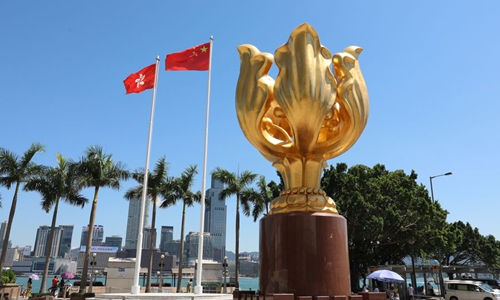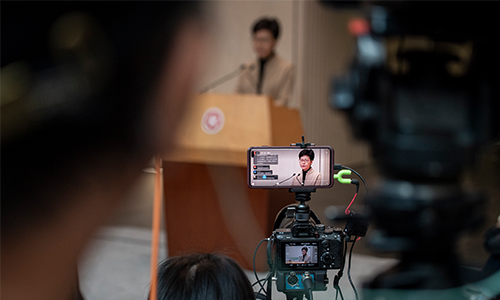HOME >> CHINA
Central govt final arbiter of Basic Law issues
By Bai Yunyi and Wang Wenwen in Hong Kong and Chen Qingqing in Beijing Source:Global Times Published: 2019/11/19 12:10:35

Photo:VCG
China's top legislature and the State Council, China's cabinet, voiced strong opposition to the latest ruling by the High Court of Hong Kong on the anti-mask law, indicating that the ruling blatantly defies the authority of the National People's Congress (NPC) Standing Committee and of the chief executive of the Hong Kong Special Administrative Region, thus circumventing the Basic Law.
Believing the top legislature may act on the high court ruling soon, analysts said the remarks from the NPC are a fundamental denial of the Hong Kong high court's right to a judicial review regarding the Basic Law, reflecting Beijing's firm determination of having the final say on judgments related to affairs concerning the Basic Law.
The high court ruling raised concerns among some NPC deputies, the only legislative body which can decide whether laws in the Hong Kong Special Administrative Region (HKSAR) are in line with the Basic Law, Zang Tiewei, spokesperson for the Commission of Legislative Affairs of the National People's Congress (NPC) Standing Committee, was quoted as saying in a Xinhua News Agency report in early Tuesday morning.

Chief Executive of the Hong Kong Special Administrative Region Carrie Lam speaks at a press conference in Hong Kong on Tuesday. Lam called on rioters still inside the Hong Kong Polytechnic University to stop engaging in violence. Photo: AFP
"The ruling weakens the authority of HKSAR government and its chief executive, which is not in line with the Basic Law and related decisions made by the NPC Standing Committee," the spokesperson said.
Yang Guang, spokesperson of the State Council's Hong Kong and Macao Affairs Office, said Tuesday that the high court's ruling is not in line with the Basic Law, and is in open defiance of the authority of the NPC Standing Committee and of the chief executive of the HKSAR government. The ruling will generate negative social and political impacts.
Imposing the anti-mask law by invoking the emergency ordinance has played a positive role in deterring riots and violence. Hong Kong's emergency ordinance was approved by the NPC Standing Committee and was in line with the Basic Law, Yang said.
He also urged the Hong Kong SAR government and judicial organs to exercise their responsibilities in line with the Basic Law to end the violence.
Hong Kong's high court on Monday said the ban introduced under the emergency legislation was "incompatible" with the Basic Law. Hong Kong Secretary for Security John Lee Ka-chiu said the judicial process has not yet concluded, and that the decision is not the end of the judicial process.
The high court's decision shocked many people in Hong Kong, including those in law enforcement and policing.
The Legislative Affairs Commission under the Standing Committee of the National People's Congress has fundamentally denied the Hong Kong high court's right of judicial review regarding the Basic Law, Tang Fei, a member of the Council of the Chinese Association of Hong Kong and Macao Studies, told the Global Times on Tuesday.
"Right now we cannot say the ruling of Hong Kong's high court is invalid, but a formal decision by the NPC Standing Committee can be expected," he said.
Ronny Tong Ka-wah, a member of the Executive Council, told the Global Times on Tuesday that Hong Kong courts can interpret the Basic Law, but when it comes to a final decision it needs an NPC interpretation.
According to Article 158 of the Basic Law, the power of interpreting the law shall be vested in the Standing Committee of the National People's Congress.
"The current matter has gone beyond the limits of the autonomy of the HKSAR, as the latest ruling goes against the past decisions of the NPC, shaking the fundamentals of the emergency law," Li Xiaobing, an expert on Hong Kong, Macao and Taiwan affairs from Nankai University in Tianjin, told the Global Times on Tuesday.
According to the Article 158 of the Basic Law, the NPC Standing Committee shall authorize the courts of HKSAR to interpret on their own, in adjudicating cases, the provisions of the Basic Law, which are within the limits of the autonomy of the region.
However, if the courts, in adjudicating cases, need to interpret the provisions of the Basic Law concerning affairs which are the responsibility of the central government, or concerning the relationship between central authorities and the HKSAR and if such interpretation affects the judgments of cases, the courts of the region shall, before making their final judgments, which are not appealable, seek an interpretation of the relevant provisions from the NPC Standing Committee through the Court of Final Appeal of the Region.
Hong Kong lawyers and legislators have called for the NPC Standing Committee to provide an interpretation of the Basic Law given the urgency of ending the current violence that has engulfed the city.
Lawyer Kennedy Wong suggested the Department of Justice of Hong Kong should file an appeal by citing the cases regarding emergency laws and anti-mask laws in other countries and regions. He suggested that the government should ask the NPC Standing Committee to make an interpretation.
Wong noted that the timing could be in December when the standing committee is due to meet.
Hong Kong legislator Junius Ho echoed the view, saying it is necessary for the NPC to make an interpretation based on the current situation in Hong Kong, and explained that the power conferred to the chief executive to enact the emergency law is legitimate and necessary.
Witman Hung Wai-man, a Hong Kong deputy to the 13th NPC, told the Global Times on Tuesday that remarks made by the Legislative Affairs Commission under the NPC Standing Committee are absolutely right, and whether Hong Kong laws contradict the Basic Law can only be interpreted by the Standing Committee. And if the NPC makes a decision, all Hong Kong courts must rule in accordance to that.
Hung noted that there are three ways to make an interpretation.
"It could either be raised by the Court of Final Appeal or the SAR government. Meanwhile, the NPC can take the initiative to make the interpretation," said Hung.
The NPC has twice made interpretations of the Basic Law since Hong Kong returned to China in 1997. In 2016, the NPC Standing Committee issued an interpretation of the Basic Law in response to disagreements on the provisions of the Basic Law. In 2004, it issued an interpretation which suggested a "mechanism for amending the electoral method for selection of the Chief Executive and the method for the formation of the Legislative Council."
Newspaper headline: China’s top legislature slams HK court ruling; remarks seen as ‘fundamental denial’ to HK court’s decision on issues of constitutionality
Posted in: HK/MACAO/TAIWAN